Mass Effect 3 Review
In many ways, Mass Effect 3 is the best game in the trilogy, but its greatness is obfuscated by significant technical and narrative inconsistencies
After BioWare took Mass Effect 2 in a more shooter-heavy direction than its primarily role-playing focused predecessor, they have one again gone back to tinkering with the genre scales for the third and final iteration of the epic science fiction trilogy. While it plays much more like Mass Effect 2 than 1, BioWare has combined elements from the first two games, and have hit the sweet spot as far as gameplay and pacing is concerned. Unfortunately, the game does a poor job of wrapping up the story, and a significant number of irritating technical issues rear their heads throughout the experience. Despite these issues, Mass Effect 3 offers an intoxicating experience all the way up to (but sadly not including) the end, and will thrill fans of the first two games for the duration of the journey.
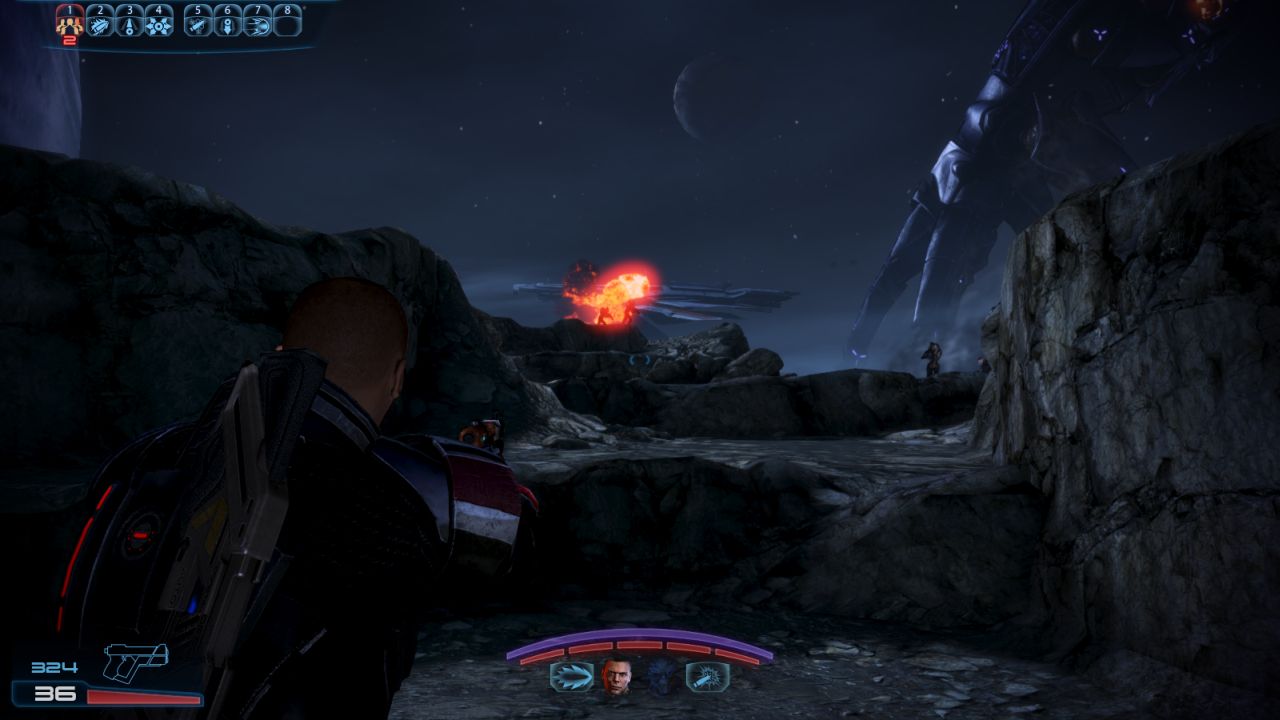
Some drab foregrounds are made up for by impressive backdrops
While Mass Effect 2 offered a more measured pace in the battle against the Collectors, with a story that focused as much on characters as the primary threat, Mass Effect 3 is about all-out war with the Reapers. The game tries hard to make you feel the sacrifices involved in such a conflict, and while it generally succeeds when dealing with the deaths of known characters, the storytelling can be heavy handed as it tries to cram certain tragic events down your throat. Still, despite some occasionally corny lines, the emotional impact here is greater than in most games, largely in part to the believable characters and strong plot that stays exciting and unpredictable right up to the end. The story is full of amazing memorable moments and powerful images that will stick with you long after you finish playing.
There were a few events in the story that confused me however, and the ending itself tries to emulate Kubrick's 2001: A Space Odyssey by leaving some things open to interpretation, but ultimately bungles it with some obvious inconsistencies and a lack of resolution. If you were hoping the decisions you made across the three games would make a big difference in how the end plays out, you might be disappointed with what is here, with most decisions only affecting a number which impacts what endings are made available to you.
As far as gameplay is concerned, your time will once again be spent mostly in combat or lengthy interactive dialogue sequences. BioWare has trimmed the fat off the gameplay, with hacking mini-games gone altogether and planet scanning of less prominence than in the second game. Once again you will choose a class that has a different set of powers, but now you can choose how many and which types of weapons you want to equip. You can carry up to five weapons, one each of a shotgun, sub-machine gun, pistol, assault rifle and sniper rifle, but the more weapons you carry, the longer your powers will take to recharge. You have to decide if you want to focus on gunplay or powers, or a mixture of both, and this will largely define how you make your way through the greatly improved combat scenarios.
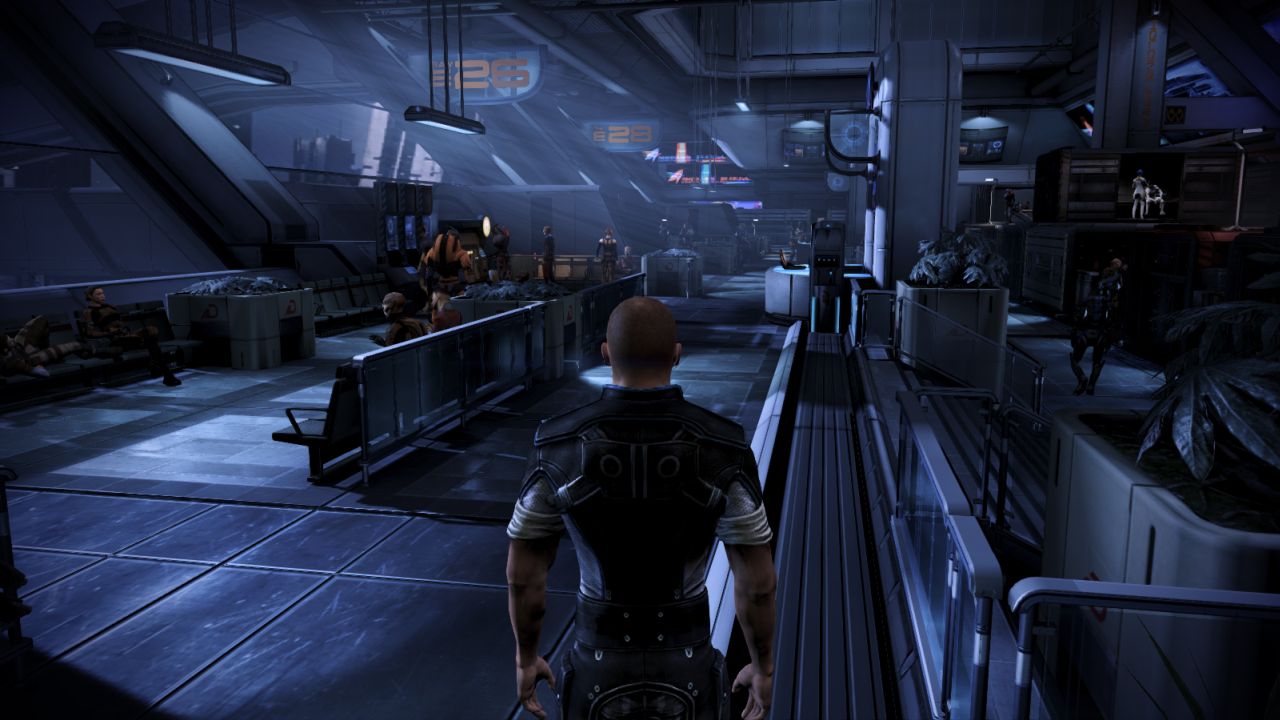
The Citadel has seen a bit of a makeover since the second game
The actual missions in Mass Effect 3 are fairly lengthy, well paced and often very atmospheric. Combat scenarios often take place in the midst of huge battles or in eerie locations, and while the basic combat remains unchanged from Mass Effect 2, improved level design as well as better weapon and enemy variety make things much more interesting. There are loads of different weapons within each weapon type, and they all feel different form one another. On top of this, they can be individually upgraded to improve accuracy and damage, as well as modified with things like scopes or materials that decrease the weight of the weapon. The shooting feels good, and the interesting combinations of enemies thrown at you encourage experimentation with power combinations. The biggest problem with the combat is that there have been several different functions mapped to the same key; roll, take cover, sprint, and interact. This can lead to situations where you are trying to roll or sprint away from an enemy when you are at low health, but instead take cover on the wrong side of a wall and get killed. You might also find that Shepard tries to activate some buttons by rolling into them.
Like with the previous games you will bring two squad mates along for each mission. You can still order them around and tell them when to use powers, but if you would rather focus on yourself they do a decent job of fighting by themselves, apart from their occasional need to run in front of enemy fire and get killed. There aren't as many squad mates to choose from as there were in Mass Effect 2, but the characters here are for the most part better developed and more interesting. Depending on the decisions you made in previous games, you will encounter old squad mates from the previous two Mass Effect titles and have a chance to catch up. The focus here is more on the story than the individual characters however, and the result is a more exciting experience that is harder to pull away from.
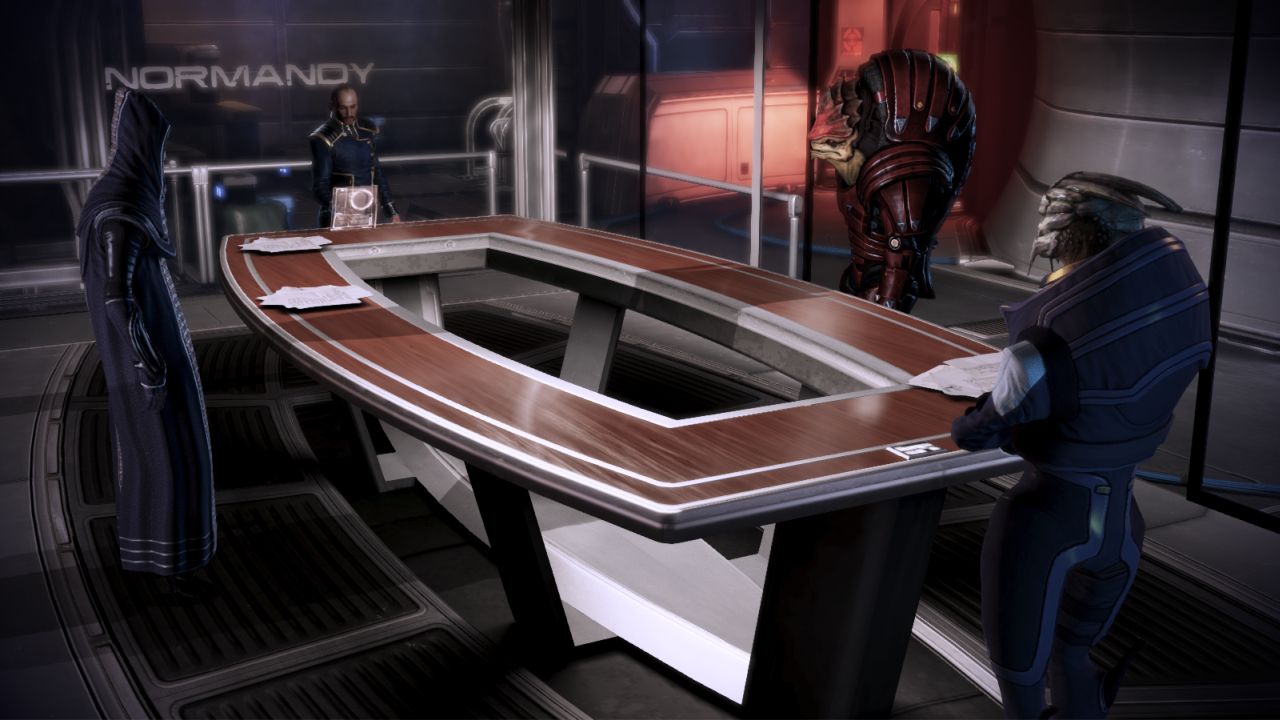
You should bring your Interstellar diplomatic A-game for this tite
If you were one of the people who thought planet scanning for resources in Mass Effect 2 was a tedious endeavour, you will be pleased to know it has been revamped to become a bit more interesting. You can go into reaper-controlled systems and scan for items of interest, but if you use your scanning device too many times the reapers will become aware of your presence and give chase. System scanning is still the weak point of the game, but it's a solid improvement over the tedious planet scanning in Mass Effect 2. There are a lot of side quests in Mass Effect 3, and they range from tedious fetch quests for people on the citadel to fairly fleshed out missions. Many of the side quests take place on maps recycled from multiplayer levels, and these diversions are generally underwhelming. Everything you do from system scanning to side and story quests will contribute to your war-readiness rating, which will impact how the ending plays out.
If the system scanning seems like an endeavor not worthy of your time, you can instead increase your readiness rating by taking to the four-player cooperative multiplayer. Basically you choose a class and join three companions fighting off waves of enemies. This mode feels fairly derivative, but some interesting weapon-dropping mechanics and the potential for combining powers in interesting ways makes this mode worth at least checking out. There are also some waves where you are required to complete simple objectives such as killing certain enemies or staying within a small zone as you upload data. Since the multiplayer is based on a peer-to-peer matchmaking system, multiplayer matches can have issues with lag; if the host has a bad connection the enemy AI can bug out and just stand still while you kill them.
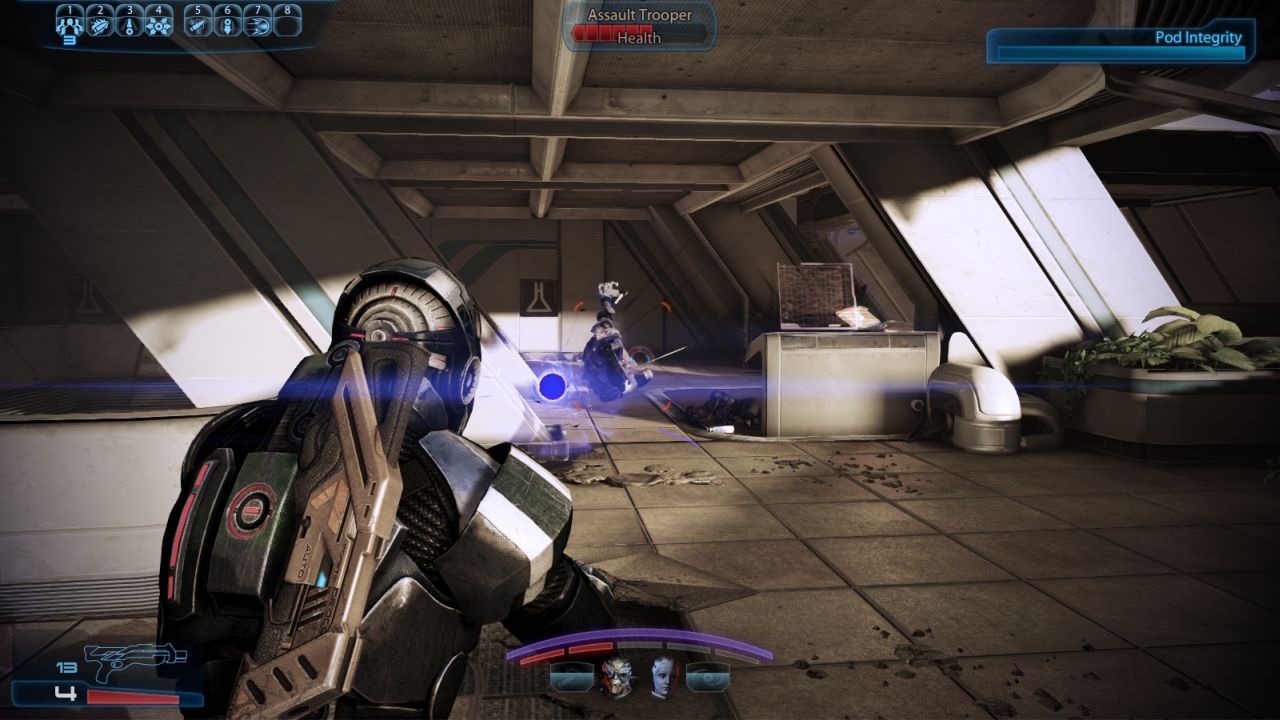
You can now forgo most firearms in favor of oft-hilarious biotic powers
While Mass Effect 2 was a fairly polished product at launch, the sequel suffers from a number of irritating bugs and technical issues. As mentioned above, an excessive number of functions given to a single key will lead to a number of untimely deaths. Enemy and friendly AI will occasionally bug out and stand on top of cover rather than behind it. During combat, the power bar you access when pausing the game occasionally became unresponsive, meaning I couldn't change weapons our use powers via this menu until it sorted itself out. I also encountered some quest bugs on the Citadel where I would complete an objective, but the game would fail to update the objective marker, still pointing me at the location of the last objective. Since the journal no longer updates your objectives in side missions, this bug essentially broke the quests where it occurred. Add to this the jarringly stiff animations and lag issues in multiplayer, and the entire package feels rough around the edges.
Visually, Mass Effect 3 is about on par with the second game in the series apart from a few lighting improvements, with inconsistent textures being made up for with amazing backdrops and detailed levels. Character models have great facial animations, but often wear blurry clothing, and tend to jerk about in cut scenes. Some of the animated cut scenes are extremely impressive, depicting large space battles and well crafted environments. The game is very well optimized at least, with even my mid-range laptop being able to achieve smooth frame rates with the settings turned all the way up. The audio in Mass Effect 3 is superb across the board, with excellent sound design, top tier voice acting, and a really excellent sound track. The strong audio goes a long way to making Mass Effect 3 a very atmospheric experience, although many of the best tracks are recycled from the first game.
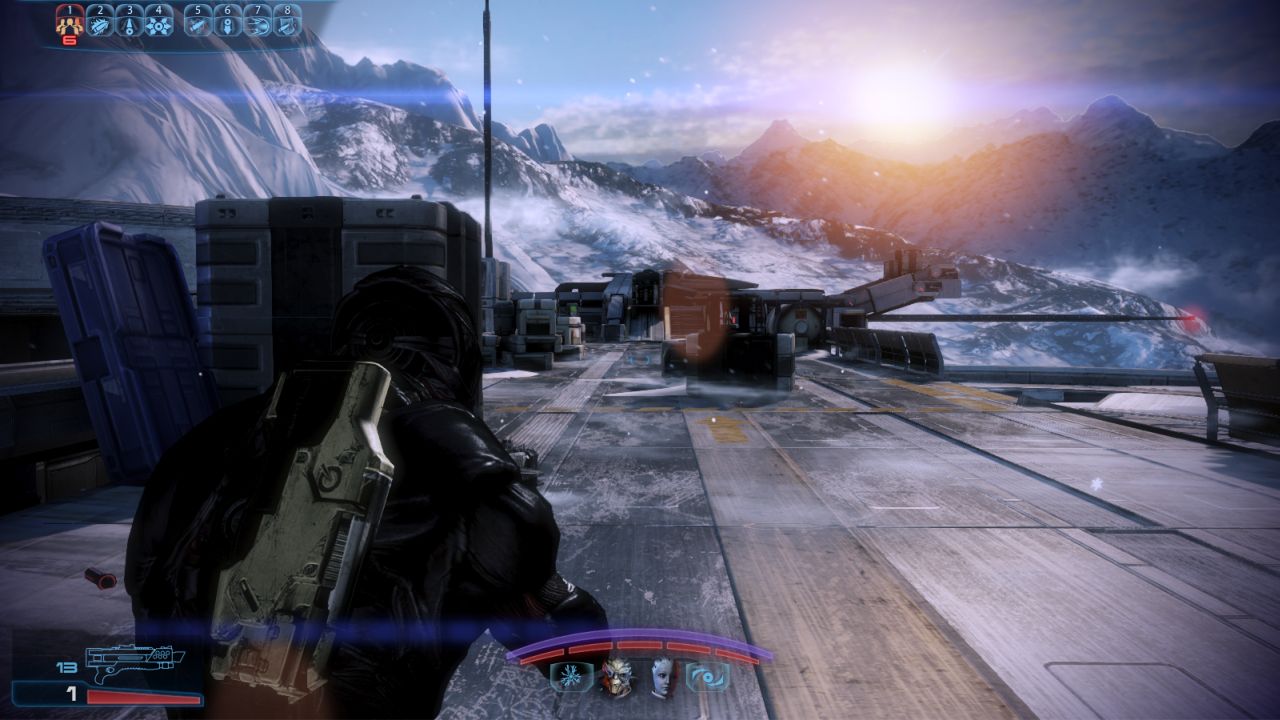
Shepard laments his refusal to purchase the improved armor heating module
When it comes down to it, despite some weaknesses, fans of the first two games will probably get a lot out of Mass Effect 3. Those who didn't get much out of the previous titles likely won't change their minds about this one. Replay value is comparable to Mass Effect 2, with different decisions across the first two games resulting in a lot of different character interactions, but mostly unchanged missions. There is a good amount of content here; the average play through of the campaign will take 20-30 hours, and the multiplayer adds a bit more bulk to the package even though it is unremarkable in itself. Despite an underwhelming ending, Mass Effect 3 is a strong final chapter in this remarkable science fiction trilogy.
 Comments
Comments




















